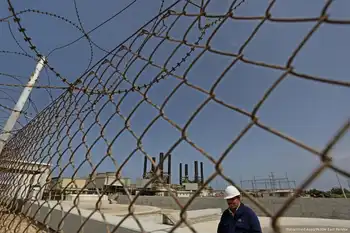Smart grid project advocated for KUB
KNOXVILLE, TENNESSEE - Smart grid technology could save KUB more than $125,000 a year - in just one neighborhood, KUB manager of system operations Mike Patterson told the utility's board of commissioners.
When faster fiber optic cables, able to quickly transmit huge amounts of data, and automated meters, able to send information back to KUB, are in place, KUB will see substantial savings in the University of Tennessee-Fort Sanders pilot area.
The utility could save $35,000 a year, Patterson said, because employees would not have to go out to residences and businesses to read meters; the new "smart" meters would send data in remotely. KUB also loses money when older meters stop working accurately and the utility company doesn't notice right away, he said, but the new system would show when meters are inaccurate or having problems, saving KUB about $51,000 a year.
And because the neighborhood is populated largely by college students, who need utilities connected and disconnected more frequently than most other residents, Patterson said KUB could expect to save about $40,000 a year from "reduced field service costs."
The presentation didn't address what effect, if any, the reduced need for KUB service people would have on jobs.
That neighborhood is an ideal pilot site because of the diversity of customers, Patterson said. KUB serves Dow Chemical, a large business; two hospitals; and a number of smaller merchants and residences, including apartment complexes of varying sizes. KUB may also collaborate with UT facilities staff and engineering, which wants to use the smart grid technology to look at energy and water conservation, he said.
Patterson's presentation came on the heels of a Tennessee Regulatory Authority conference in Nashville, which brought together government officials, experts on the present and future use of smart grid technology, and representatives of the electric, gas and telecommunications and cable television industries.
KUB has received a $3.6 million Smart Grid grant from the federal government for its projected $7.56 million project, which Patterson said is on track to proceed by March 2010.
Patterson outlined some smart grid challenges particular to KUB, including that any new automated meters the utility places must be able to work for electric, gas and water, and that, once outside the pilot area, KUB's systems don't always overlap (for example, the utility might provide gas in an area where another company supplies electricity or water). Rural East Tennessee topography, with ridges and valleys and areas where there are long distances between customers, will also present specific challenges when the smart grid system expands to KUB's full service area, he said.
During the three-year pilot program, KUB plans to replace 3,150 electric meters, 1,100 water meters and 700 gas meters with the automated "advanced meter infrastructure," at a cost of $5.78 million, and has budgeted $245,000 to replace the existing copper wire system to three substations with fiber optic communication.
KUB officials told the board that community response to a new power substation planned for the UT area has been positive, with businesses and community organizations suggesting a piece of land at Dale Avenue and 17th Street owned by Dow Chemical.
KUB is negotiating to buy the two-acre plot, which Dow seems receptive to selling, and the community has indicated a preference for brick-and-landscaping design. Officials said KUB should have a design this winter, bid the job in spring 2010, construct the substation in summer and fall 2010, and install the equipment in the winter and spring of 2011.
UT, which expects a 60 percent increase in electricity use by 2020, requested the new substation in response to planned growth on campus and to increase operational flexibility. Right now, the campus is served entirely from a substation on the south side of campus, which UT uses to distribute power.
The new substation is expected to improve reliability to hospitals and other customers in Fort Sanders.
Related News

Climate Solution: Use Carbon Dioxide to Generate Electricity
LONDON - The world is quickly realizing it may need to actively pull carbon dioxide out of the atmosphere to stave off the ill effects of climate change. Scientists and engineers have proposed various techniques, but most would be extremely expensive—without generating any revenue. No one wants to foot the bill.
One method explored in the past decade might now be a step closer to becoming practical, as a result of a new computer simulation study. The process would involve pumping airborne CO2 down into methane hydrates—large deposits of icy water and methane right under the seafloor, beneath water 500 to…




